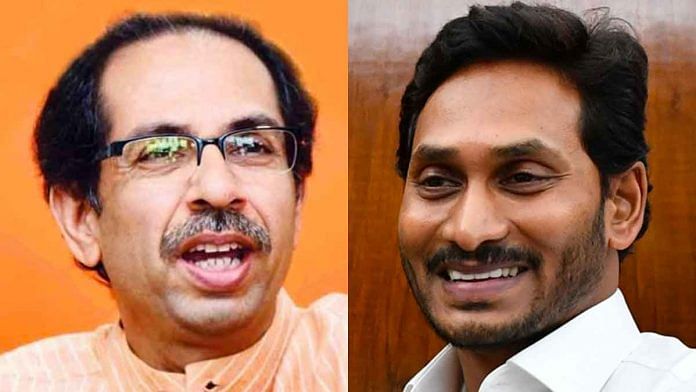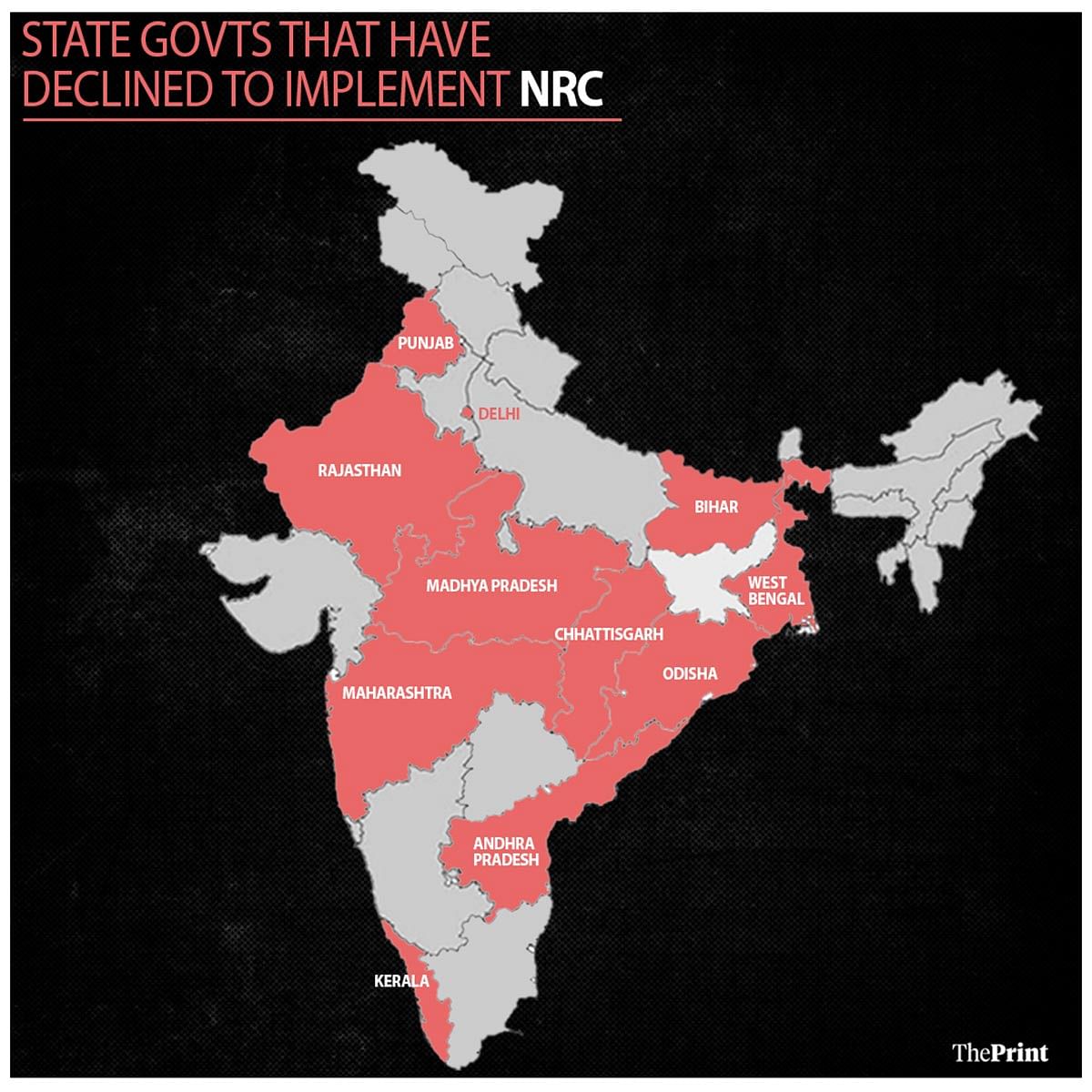
New Delhi: As protests against the Citizenship (Amendment) Act continue across the country, 11 chief ministers have rallied against the implementation of the National Register of Citizens in their respective states.
The 11 states account for 54 per cent of India’s landmass, and 56 per cent of its total population.
The chief ministers’ vocal opposition comes despite Prime Minister Narendra Modi’s insistence at a rally in the capital Sunday that his government and Parliament have not discussed the NRC, which contradicts a number of statements made by Home Minister Amit Shah as well as President Ram Nath Kovind.
The latest CMs to join the list are Y.S. Jagan Mohan Reddy of Andhra Pradesh and Uddhav Thackeray of Maharashtra.
Reddy, whose YSR Congress had supported the passage of the CAA in Parliament, announced at a rally in Kadapa Monday that his government would not support the implementation of the NRC.
Meanwhile, addressing a delegation of Muslim leaders, Thackeray said his government would not implement the CAA or the NRC, and insisted that no detention centres will be built in Maharashtra. Thackeray’s Shiv Sena, a former ally of the BJP which joined hands with the NCP and the Congress to form the government in the state, had voted in favour of the CAA in the Lok Sabha, but abstained from voting in the Rajya Sabha.
Many other non-BJP states and even NDA allies have joined the chorus against the NRC. Here’s a list of the states whose leaders have said no to the NRC.

Also read: Decoding National Population Register: What it is & its link to NRC
Bihar
Bihar Chief Minister Nitish Kumar said on 20 December there was no question of implementing the NRC in his state. This is despite the fact that his JD(U), with 19 members in the Lok Sabha and six in the Rajya Sabha, is one of the biggest constituents of the NDA apart from the BJP, and had voted in support of the CAA.
Odisha
Naveen Patnaik, leader of the Biju Janata Dal that rules Odisha, has declined to hold the NRC in his state despite its 12 Lok Sabha and seven Rajya Sabha MPs voting in favour of the CAA in Parliament. Patnaik said on 18 December CAA has nothing to do with Indian citizens, and only deals with foreigners, which is why his party supported the amendment to the Citizenship Act of 1955.
Punjab
Captain Amarinder Singh was one of the first chief ministers to come out against the CAA and the NRC. Even before the CAA was passed, Congress’ Singh had said on 7 December that it would not be allowed in Punjab. He had also said the NRC was against the democratic spirit of India.
Chhattisgarh
A day after his Punjab counterpart and fellow Congress leader opposed the NRC, Chhattisgarh CM Bhupesh Baghel had also declared in an interview with ThePrint’s Editor-in-Chief Shekhar Gupta on 8 December that his state had “no need” to implement it, and that it was secure from infiltrators. He reiterated on 23 December that the Modi government was harassing the general public by passing “vague” laws like the CAA, and said his state won’t support such “black laws”.
Also read: All-India NRC will certainly fail. Here’s what Modi govt should do for its citizenship plan
Kerala
The Left Democratic Front government headed by Pinarayi Vijayan has also been opposing the CAA and the NRC since 12 December. In fact, Kerala saw the ruling Left and the opposition UDF led by the Congress unite on the same stage to oppose the CAA legislation. Vijayan has declared his solidarity with the ongoing protests across the country, and said the CAA is unconstitutional.
West Bengal
West Bengal Chief Minister Mamata Banerjee of the Trinamool Congress has stood staunchly against the CAA and the NRC since the Rajya Sabha passed the law on 11 December. She has held many public rallies on the issue, and has also demanded a UN-monitored referendum for its implementation.
Rajasthan
On 22 December, Rajasthan Chief Minister Ashok Gehlot of the Congress addressed a rally in Jaipur against the new law, declaring that his government would not implement the NRC either. He also pointed out the opposition to the NRC from Bihar and Odisha, saying even NDA partners and those who supported the bill in Parliament are not standing for it.
Madhya Pradesh
Madhya Pradesh Chief Minister Kamal Nath, on 23 December, vowed not to implement the CAA and the NRC in the state. He observed that this law is against the spirit of the Constitution.
Delhi
Delhi Chief Minister Arvind Kejriwal and his Aam Aadmi Party have also spoken out against the CAA and the NRC. The AAP also opposed the new citizenship law in Parliament.
Also read: Vajpayee-Advani imagined an all-India NRC and Modi-Shah added a Muslim filter

Is it really unconstitutional? I don’t think so
Jab Mulla Desh pe Lanka kar legs tab tumahae secular ism yadd ayagae . Religion and language is not a small thing it makes country ,
India will only exit on the religion on hindu
You people don’t havtake history lesson and you don’t know about concept of Islam
They will through out other religion like in Kashmir and will happen in Kerala near future
Remember it it will definitelly happen.
Someones tell me that…
If 12th stage refuse any law then govt should have to remove that law…
Is this true…
If yes then…..
What happen right now…
You missed out Telangana … y ????
Telangana Assembly will pass resolution against CAA: KCR – India News – https://www.indiatoday.in/india/story/telangana-assembly-will-pass-resolution-against-caa-kcr-1640195-2020-01-26
Splitting the people in the name of religion and God in India will lead to another disintegration of the nation. The concept of religion is purely man made and no God has blessed their own followers. These type of unholy alliance of the people against another particular section of the people who are living in this long back will definitely ruin the very existence of country. Animal has no religion and no living thing except the human beings are identified by their religion but they are living happily. Please see the people as human. Live with your neighbours in harmony. You will be happy.
Kashmir and north east don’t have free voice because of restrictions by govt so ths figure is not 56 percent out of entire population.
There is no any country in the world where you go and become resident easily, you have to follow there citizenship rules and regulations,procedure… But only in India people coming from our neighbors country and becoming a citizen easily through unlawful way with the help of the vote politics concept. This must be stopped. Those who are opposing, they must clearly indicate a path to stop the situation, otherwise in future after 15-20 years also this unlawfully entry will be happening.
Does this even matter? Wouldn’t centre just order states to follow it?
A 40% PM imposes on 56% of the people in the country. Another stupid legacy from the US lap dog.
This number will increase from 11. Modi-Shah do not realize that people all over India have rejected the concepts of CAA and NRC. More and more states will become non-BJP just for this reason. Long live our Democracy and Secularism.
Even telegana also oppose nrc.. even it voted against CAA. Now Jharkhand has new govt ..it will also say no.. tamilnadu will also give no… then who is in support.. Gujarat Karnataka up …